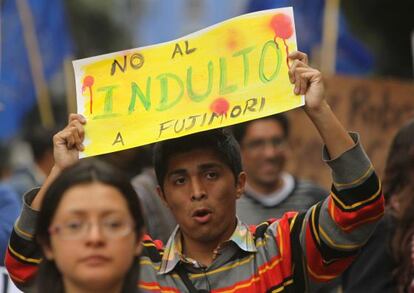Prosecutors in Peru reopen probe into Fujimori's forced sterilization policy
Thousands of women were obligated to have surgery under family planning law

Peruvian prosecutors have decided to reopen an investigation into forced sterilizations that reportedly took place during Alberto Fujimori's 1990-2000 rule as president.
Last Friday's decision comes after the Inter-American Human Rights Commission (IAHRC) asked Lima in October 2011 to reopen an inquiry, shelved more than two years ago, after some 2,000 women came forward to denounce the alleged practices. Many women said they were forced against their will while others claimed they were given food and social aid if they had "voluntary contraceptive surgery."
Among those being investigated is Fujimori's former health minister Alejandro Aguinaga, who is now head of the jailed ex-president's medical team.
Fujimori is serving a 25-year prison sentence for two massacres that took place during his tenure. In poor health, the 75-year-old has asked for a presidential pardon, which has angered many Peruvians.
The forced sterilization allegations became a major issue during the 2011 presidential race, when the candidate-now-President Ollanta Humala mentioned it in a debate with Keiko Fujimori - the disgraced former leader's daughter. Humala never brought it up again until Sunday during an activity marking International Day for the Elimination of Violence Against Women.
We cannot let this type of violence against women go unpunished"
"I believe that we are a country that strictly adheres to international law, and if we have to investigate these forced sterilizations, we are going to do so according to the law. We cannot let this type of violence against women go unpunished," he said.
Between 1995 and 2001, there were 272,028 sterilizations undertaken under a family planning law introduced by Fujimori.
In 1999, the Latin American and Caribbean Committee for the Defense of Women's Rights (CLADEM) denounced that many clinics were under pressure - as well as receiving incentives - to meet quotas. A majority of the victims were poor young women and members of indigenous rural communities who were never informed about the procedure and were completely deceived.
One of the more famous cases was that of Mamérita Mestanza, a 33-year-old woman who died in 1998 after she was submitted to a sterilization procedure in Encañada, Cajamarca province. According to testimony taken by IACHR, health officials were threatened with fines and prison terms if they didn't operate on the mother, who already had seven children. After the original complaint was dropped by the Peruvian courts, Mestanza's family took the case to the IACHR.
According to Peruvian lawmaker Jeannette Llaja, the former health minister, Aguinaga sent a letter to prosecutors in 2011 asking them to drop the inquiry when they first tried to reopen the investigation.
Tu suscripción se está usando en otro dispositivo
¿Quieres añadir otro usuario a tu suscripción?
Si continúas leyendo en este dispositivo, no se podrá leer en el otro.
FlechaTu suscripción se está usando en otro dispositivo y solo puedes acceder a EL PAÍS desde un dispositivo a la vez.
Si quieres compartir tu cuenta, cambia tu suscripción a la modalidad Premium, así podrás añadir otro usuario. Cada uno accederá con su propia cuenta de email, lo que os permitirá personalizar vuestra experiencia en EL PAÍS.
¿Tienes una suscripción de empresa? Accede aquí para contratar más cuentas.
En el caso de no saber quién está usando tu cuenta, te recomendamos cambiar tu contraseña aquí.
Si decides continuar compartiendo tu cuenta, este mensaje se mostrará en tu dispositivo y en el de la otra persona que está usando tu cuenta de forma indefinida, afectando a tu experiencia de lectura. Puedes consultar aquí los términos y condiciones de la suscripción digital.








































